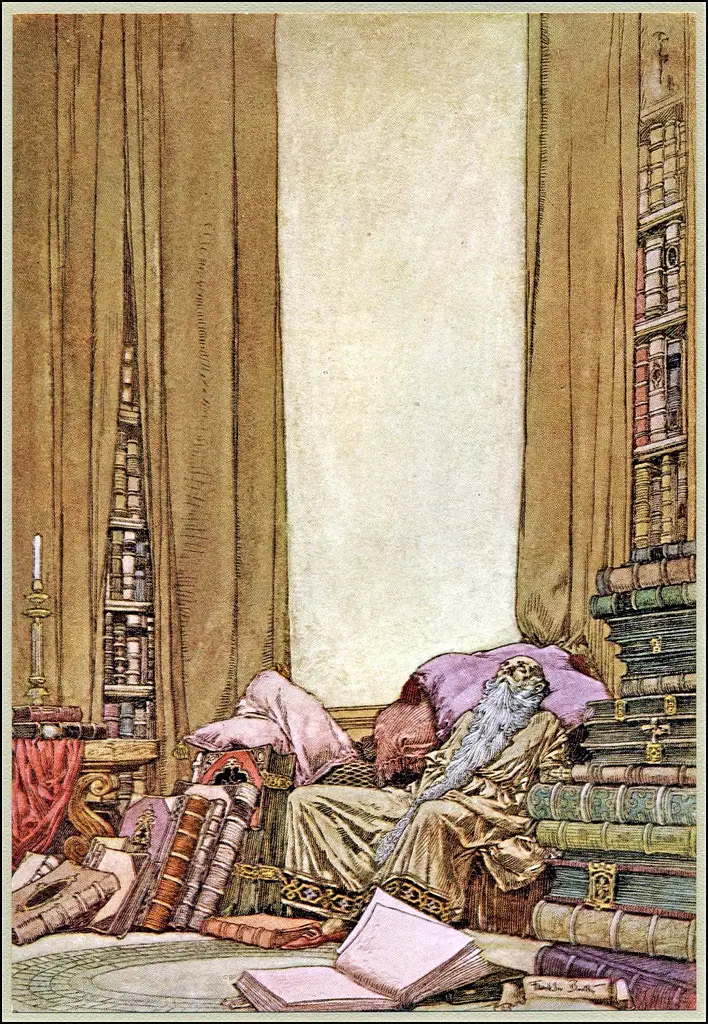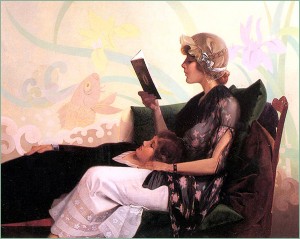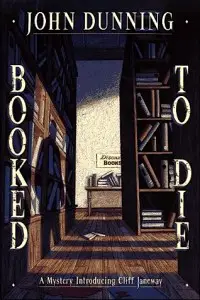 Why collect books? Why indeed. I asked myself the same question in the bathtub, snapping the binding of the latest Sue Grafton. I love to read but why bother to keep the book (just more clutter) let alone get a signature, put mylar on the dust jacket and place it it on a book shelf? The answer came to me as I as I saw the same Grafton double in price (this was quite some time ago–Graftons would not be valuable at the print run she has today), and friends proudly displaying their beautiful signed first editions. Hey, I read all of those books, loved them all, splattered water on them! The plain simple fact is reading a book with an autograph or inscription is much more gratifying than breaking the spine and dipping it in water.
Why collect books? Why indeed. I asked myself the same question in the bathtub, snapping the binding of the latest Sue Grafton. I love to read but why bother to keep the book (just more clutter) let alone get a signature, put mylar on the dust jacket and place it it on a book shelf? The answer came to me as I as I saw the same Grafton double in price (this was quite some time ago–Graftons would not be valuable at the print run she has today), and friends proudly displaying their beautiful signed first editions. Hey, I read all of those books, loved them all, splattered water on them! The plain simple fact is reading a book with an autograph or inscription is much more gratifying than breaking the spine and dipping it in water.
Don’t get me wrong, I still read in the tub, just much more carefully. There are many types of collectors:
Those who read and collect
Those that collect then read
Those that collect with the possiblilty of increasing their investment
Those that collect and never read
I fall into three categories:
Get a signed book and read it, and keep it because I loved it
Get a signed book and read it in paperback if I’m afraid a ferret will plunge it in the bubblebath
Know that some of my choices may increase in value
The last is what is called hypermodern. Hypermodern consists of speculating on what books may increase in value because of the quality of the work, and the low print run-supply and demand.
I was introduced to this world when I began managing a major mystery bookstore in Manhattan. Before that, I’d never heard of such a thing. I bought from bookstores, yes, but mostly tried to keep my budget low by scouring garage sales, church sales, and library fundraisers. Usually the hardcovers I owned were biographies or large histories of the movie industry. I didn’t have the dough to purchase every new mystery that came out. Even the first mystery bookstore I’d worked at ignored the phenomenon. When I started at the second store, I thought I’d be doing the same thing there as I did before-recommend titles and authors to eager customers, albeit, upstairs surrounded by nothing but hardcovers, some old and rare.
The shock began when a former manager was rehired part time exactly the same moment I was made the new one. Talk about job insecurity! Around the end of the first week, he casually mentioned, “you know about hypermodern collecting, right”? UH, what? I’m definitely hyper, and think I’m rather modern, but, uh, what? He explained the concept using a book by then newcomer, George Pelecanos. A Firing Offense was first published by a small firm, with a very small print run. But once Pelecanos started to make a splash with his second or third book, book collectors also wanted his first. But, and this is crucial, the copy must be in mint condition, meaning, no bumped corners, no torn or folded pages, the dust jacket without chips, tears, or obvious wear. Which, is not that easy to come by after a book has been out awhile and so few copies were printed. Probably, a good portion of the run went to libraries too, which nullifies any value. An ex-library copy is considered worthless, by collectors. There are pockets, stamps, the dust jacket more often than not has been trimmed, and many times glued to the boards of the book. Another note–book clubs–those things that grab you with 10 books for a penny, so long as you agree to buy a book a month for the rest of eternity, are also worthless. They are usually smaller, have no price on the jacket flap, and obviously are not first editions. And, no remainders! Remainders are piled in your local B&N for cheap prices–they usually have a black magic marker line on the bottom of the bound pages indicating they’ve been bought from the publisher for sale purposes.
moment I was made the new one. Talk about job insecurity! Around the end of the first week, he casually mentioned, “you know about hypermodern collecting, right”? UH, what? I’m definitely hyper, and think I’m rather modern, but, uh, what? He explained the concept using a book by then newcomer, George Pelecanos. A Firing Offense was first published by a small firm, with a very small print run. But once Pelecanos started to make a splash with his second or third book, book collectors also wanted his first. But, and this is crucial, the copy must be in mint condition, meaning, no bumped corners, no torn or folded pages, the dust jacket without chips, tears, or obvious wear. Which, is not that easy to come by after a book has been out awhile and so few copies were printed. Probably, a good portion of the run went to libraries too, which nullifies any value. An ex-library copy is considered worthless, by collectors. There are pockets, stamps, the dust jacket more often than not has been trimmed, and many times glued to the boards of the book. Another note–book clubs–those things that grab you with 10 books for a penny, so long as you agree to buy a book a month for the rest of eternity, are also worthless. They are usually smaller, have no price on the jacket flap, and obviously are not first editions. And, no remainders! Remainders are piled in your local B&N for cheap prices–they usually have a black magic marker line on the bottom of the bound pages indicating they’ve been bought from the publisher for sale purposes.
So, informed of this weird world, I began to look closely at what was required of me to compete. I studied publishers catalogs, read a slim newsletter publication called Bookline, that predicted the next ‘collectible’ book, and talked with customers who came in regularly to purchase the latest possible money maker. I became thoroughly emersed in the convoluted thinking required to sell in this manner. I found titles and authors with small runs, studied reviews, synopsis’ and read advanced reading copies, or ARCs. I scheduled author signings, pitched books to collectors, and rather quickly became an expert in the field, such as one could be. And boy did I sell books, loads of them in fact. Everyone wants a good read, but if it may be valuable down the line, gravy, just gravy.
A first time author with less than a 3,000 print run, from a small press, would get the attention of the hypermodern community. Quality does, really does matter. So do signatures. And condition. And obviously not all titles from a first time author would increase in value. Maybe very few would. But what fun and satisfaction there was in guessing which book would and which wouldn’t. I loved it, because with a first time author I’m introduced to new characters, settings, and if successful, my purchase of the book gave me the feeling I played a small part in helping the author and his work become known and popular. And some of my picks did increase in value, if only for a certain period of time-a couple of early Lehanes, S. J. Rozan, One For the Money -Janet Evanovich and others I can’t pull out of my hat at the moment.
How was this new collecting mania born? Some believe John Dunning’s brilliant Booked to Die, which focused on 2oth century literature as investments was the impetus. But Dunning never advocated new titles as possible cash cows, he was writing about searching for and finding rare books in dust jacket from earlier times. However, what happened when Booked to Die was published with a small print run was IT became collectible, so much so that at one point a first edition was up to around 900 dollars. I haven’t checked lately, I’ve no doubt that just like the real commodities market, that price has dipped down. ( I just checked bookfinder–it runs from 1,000, to 2000 something, depending on condition)
Booked to Die, which focused on 2oth century literature as investments was the impetus. But Dunning never advocated new titles as possible cash cows, he was writing about searching for and finding rare books in dust jacket from earlier times. However, what happened when Booked to Die was published with a small print run was IT became collectible, so much so that at one point a first edition was up to around 900 dollars. I haven’t checked lately, I’ve no doubt that just like the real commodities market, that price has dipped down. ( I just checked bookfinder–it runs from 1,000, to 2000 something, depending on condition)
Whatever the origin, the collectors had a new reason to justify their passion. Possible profit down the line.
Commodity book buyers cropped up–those who would buy a first edition of Charles Todd’s A Test of Wills, and then in six months turn it around and sell it for 100 bucks. Profit. And short term. (bookfinder has it for less than 100 up to well over 100.00) Because as with everything, there are ups, and there are downs, and my feeling is the hypermodern world peaked–quite some time ago, and hasn’t made a return visit as of yet.
But that’s not to say collecting isn’t still a viable and wonderful thing! Just don’t expect profit from doing so. Collecting a particular author because you love his or her output is a good enough reason. Collecting because you enjoy autographed books is also fine. The only category of collecting I don’t understand, is those who collect but never read a single title, whether in hardcover or paperback. I have many books I’ve not read, and probably never will read, but I have them because I’ve met the author and liked him as a person, or I hope to read someday, or yes, maybe it’s not my cup of tea, but perhaps it will increase in value. But most, I collect for the love of the printed word, the story, the mystery. The inscription is icing.
My last word, for now, on collecting, I frankly believe that to enjoy the process you must collect *only* what interests you, what you love, not because it may make a few pennies at some point.
Just a note–there are more points on collecting up my sleeves–I’ll parcel them out later

Oh, sure. Keep us in suspense! 🙂
Hypermodern book collecting? All new to me! Clearly life is much less stressful in a library, yay! I never realized how broad a book-seller’s duties ran.
BTW, you said: “Probably, a good portion of the run went to libraries too, which nullifies any value. An ex-library copy is considered worthless, by collectors.”
The only exception would be the value found in dismantling an illustrated ex-library book and selling the (unmarked) plates. But I don’t think you’re speaking to that, I just have to throw in my view.
Nancy–LOL–I’M not saying ex library books are worthless, I’m just reporting on what collectors believe. I have many ex library books in my collection, and love them–even if they aren’t valuable.
I don’t believe many bookstores concern themselves with the hypermodern aspect of collecting anymore, supposing they ever did. This was a phenomenon I experienced at a couple of specialty indies in the 90s. I believe some are still concerned with it, but prices have dropped considerably, just like the real market.
I didn’t think you were saying that 🙂 but judging by what I see sold on eBay, Amazon, etc., those ex-library books that aren’t selling whole because of the stamps and pockets and labels are being parted for their clean, wonderful illustration plates. I was a little off-topic, my point wasn’t entirely in line with your post’s focus on the hypermodern collectability value of the whole book, I was just thinking that people can still make a ton of dough off just about any book (as you know!). And is ‘collectability’ a word? Too lazy to get out my dictionary, LOL!
I’m surprised that hypermodern collecting is waning. Perhaps as more ebooks (AARRGH) are sold, the first-editions from the small presses will return and increase in value, seeing as how that pendulem likes to keep on swaying back and forth. I really like the idea of hypermodernism! But that’s the part of me that cherishes fine paper and letterpress and a beautiful deckle edge. I feel very lucky in my job. We have many old books that we’ve taken out of circulation (a few late 1800’s, mainly early 1900’s) and they are kept as library usage only, so guess what I’m doing during a lull? Yes, I’m putting some loving on those old books!
And I have a question for you as an ex-bookshop person: do people ever steal just the pages from books?
And don’t forget to pull out those other points on collecting from your sleeves!!
The suspense,,, aiiii !!!
How do you get a little smiley face in a post??? I am so technically challenged. And, I cannot spell! If spellcheck on safari didn’t exist, I’d be dead in the water.
Anyhoo, oh yes indeedy, we know about people taking plates from books, don’t we? And they sure aren’t just ex library. You know you shouldn’t get me started on that!
There is no off topic here–so stop with that concern–unless you all of a sudden go off on a tirade about aliens landing and eating your pet canary, or some other completely out of the world subject, you’re fine.
Yep, collectability is a word, just ignore the red line underneath–the spell check does that to my ‘anyhoo’ and ‘indeedy’ too.
I hadn’t considered the ebook thingy affecting hypermoderism–you may have a very good point there. I’d need to check with some friends who still run stores and see what’s up.
I need to tell you about my first experience with an old title not being able to leave the library–another article another time–so yeah–great for you, but what about we poor people dying to look and touch the fab books, boo hoo!
I’ve never had pages pulled from books when I was selling them–but, I sold mysteries, and unless there was some sadistic madman who wanted no one to know whodunit, therefore ripped the final page out of each book, there would be no reason for stealing pages. Tee hee.
I can’t remember what points I meant were up my sleeves–but seeing how spring is coming and my sleeves shorter, I’d better get cracking.
PS don’t you just love how I utilize my flickr stream here? Ha ha ha.
Oh, those smiley faces! Silly things. All I did was a colon and a parenthesis! This site has inner magical powers. Or maybe it worked because “This is a Gravatar-enabled weblog. To get your own globally-recognized-avatar..” etc.( see it’s written just above the ‘submit comment’ box) and I registered at Gravatar, made my avatar, and it appeared the time I commented. PRESTO!
Oh, I disabled Safari’s spellcheck because I frequently want to use vernacular and purposefully mis-spelled words; that red line gives me the heebies.
I actually don’t *worry* about staying on-topic, but I don’t want to pull the comment thread away from YOUR focus. Just bein’ polite and humble and all – as if!
Anyone can come in and fondle our library-use-only books, but the books cannot leave the building without police escort, a contract signed in blood, and a huge deposit (check made out to Nancy Ellis, ‘k?). No, we would just ask people to wash their hands first but you know what? I’m the only person who looks at them on a regular basis!! Our patrons love to read, don’t get me wrong, but few are interested in the charm of old books. Sigh.
And I love how you use your Flickr stream here- gorgeous decor on these pages, darlin’!